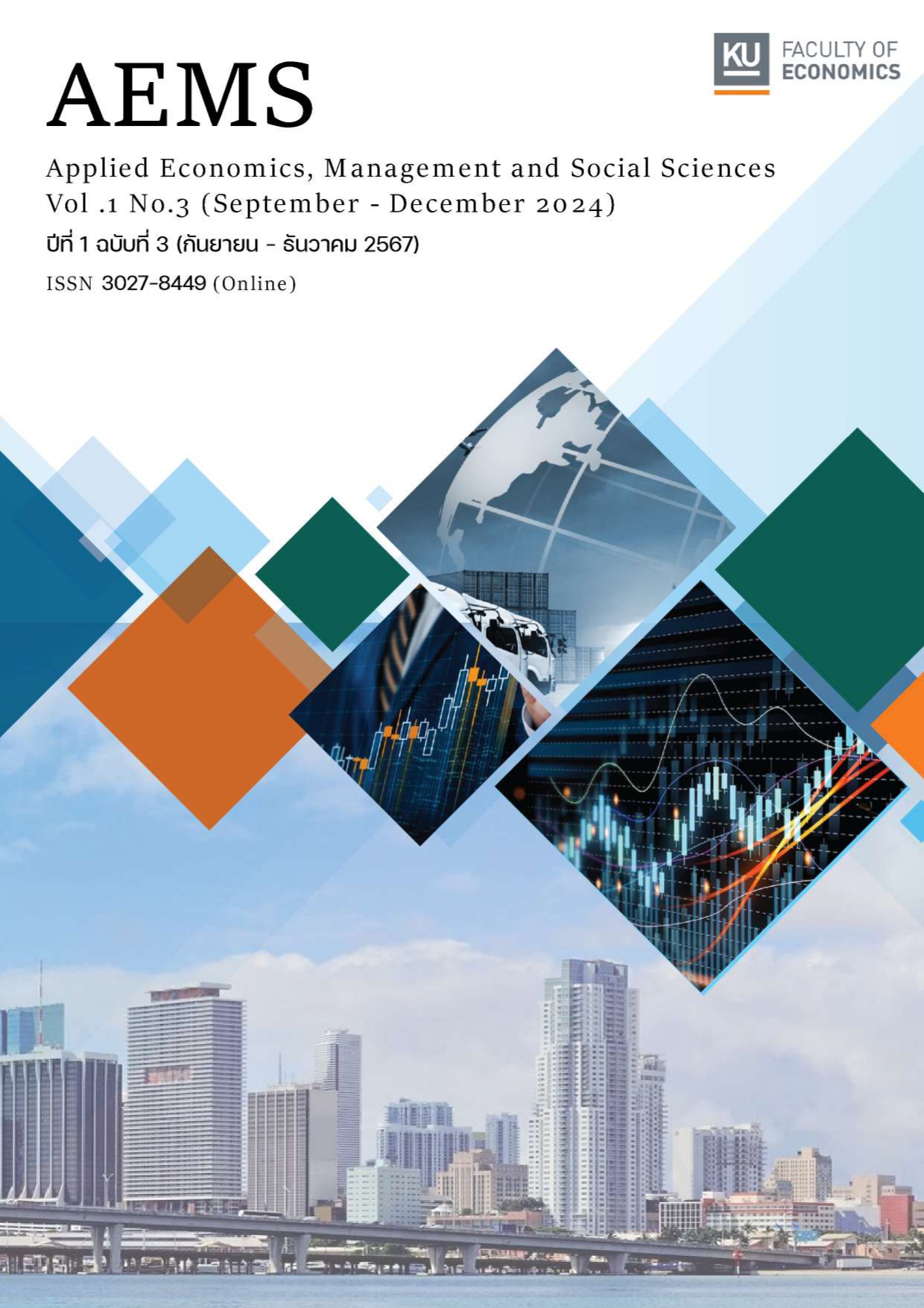Factors Affecting Adoption of Low-Carbon Technology by Paddy Rice Farmers
Main Article Content
Abstract
Rice is considered an important economic crop for Thailand. Nevertheless, rice production releases a significant amount of carbon emissions compared to other agricultural practices, necessitating the adoption of low-carbon technologies. This research aims to study the factors influencing the acceptance of low-carbon technology by farmers in Suphan Buri province. A survey was conducted with a sample of 189 farmers, and the data was analyzed both quantitatively and qualitatively using Logistic Regression models and Poisson Regression models to determine the relationship between factors affecting the acceptance of low-carbon technologies of farmers. The low-carbon technologies analyzed include four methods: Laser land leveling, Alternate wetting and drying, Fertilizer usage based on soil analysis, and Straw and stubble incorporation. The study found that factors significantly influencing farmers' acceptance of low-carbon technologies at a confidence level of 95% or higher include gender, education, family members, farmland, risk preference, and farmers skills. The factors influencing the acceptance of all four technologies consistently are education, farmland, risk preference, and farmers skills, all of which have a positive correlation with technology acceptance. Conversely, the factors influencing the acceptance of different technologies among the four studied are gender and family members, where only certain technologies are accepted based on these factors. Additionally, the results from the Poisson regression model, which analyzed the number of low-carbon technologies adopted by farmers, indicated that education and farmland significantly influence farmers' acceptance of low-carbon technologies at a confidence level of 95% or higher, showing a positive correlation with technology acceptance.
Article Details
References
กาญจน์เขจร ชูชีพ. (2561). ทฤษฎีการถดถอยโลจิสติก. ค้นจาก https://forest-admin.forest.ku.ac.th/304xxx/?q=system/files/book/5%282018%29%20Logistic%20Regression.pdf.
ชุติกาญจน์ ชูสวัสดิ์. (2560). ทฤษฎีการถดถอยปัวซง. ค้นจากhttps://ethesisarchive.library.tu.ac.th/thesis/2017/TU_2017_5909030107_8296_8477.pdf.
ธนาคารกรุงเทพ. (2566). สถานการณ์การปล่อยก๊าซเรือนกระจกภาคเกษตรไทย. ค้นจาก https://www.bangkokbanksme.com/en/23-7sme3-reduce-carbon-emissions-generate-income.
ธนาภรณ์ อธิปัญญากุล, สุวรรณา สายรวมญาติ และสุภาวดี ขุนทองจันทร์.(2564). กลไกการขับเคลื่อนการเกษตรในภาคกลางสู่เกษตรสมัยใหม่ของประเทศไทย: กรณีศึกษาข้าว. กรุงเทพฯ: สำนักงานคณะกรรมการส่งเสริมวิทยาศาสตร์วิจัยและนวัตกรรม.
พรรษสรณ์ ชาญบัณฑิตนันท์, เออวดี เปรมัษเฐียร และอภิชาต ดะลุณเพธย์. (2565). การยอมรับเทคโนโลยีเกษตรแม่นยำของเกษตรกรในอำเภอพระพุทธบาท จังหวัดสระบุรี. วารสารวิทยาศาสตร์เกษตรและการจัดการ, 3(1), 29-38.
สำนักงานเศรษฐกิจการเกษตร. (2566). เศรษฐกิจการเกษตรรายสินค้า ปี 2566. ค้นจาก https://www.oae.go.th/assets/portals/1/files/jounal/2567/commodity2566.pdf.
อุรัสยา แก้วคำ. (2565). การยอมรับมาตรฐานการผลิตข้าวอย่างยั่งยืนของเกษตรกรในจังหวัดสุพรรณบุรี. (วิทยาศาสตรมหาบัณฑิต, มหาวิทยาลัยเกษตรศาสตร์).
Chen, Z. D., & Chen, F. (2022). Socio-economic factors influencing the adoption of low carbon technologies under rice production systems in China. Carbon Balance and Management, 17(1), 19.
Jiang, L., Huang, H., He, S., Huang, H., & Luo, Y. (2022). What motivates farmers to adopt low-carbon agricultural technologies? Empirical evidence from thousands of rice farmers in Hubei province, central China. Frontiers in Psychology, 13, 983597.
Liebenehm, S., & Waibel, H. (2014). Simultaneous estimation of risk and time preferences among small-scale cattle farmers in West Africa. American Journal of Agricultural Economics, 96(5), 1420-1438.
Nuthall, P.L. (2019). Farm business management: The human factor. (2nd ed.). Oxfordshire, UK: CABI.

